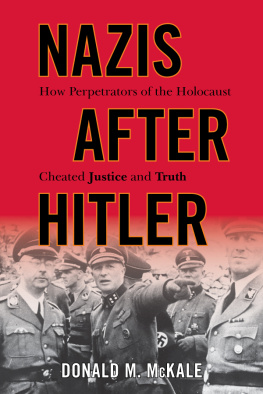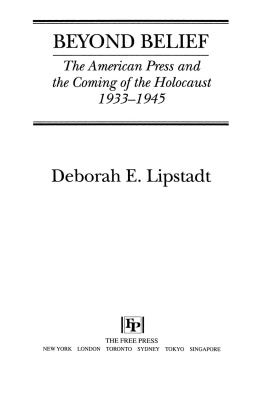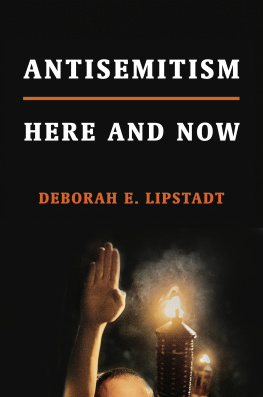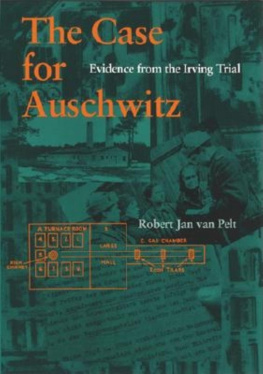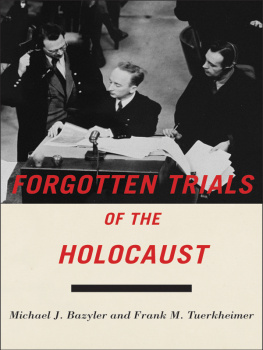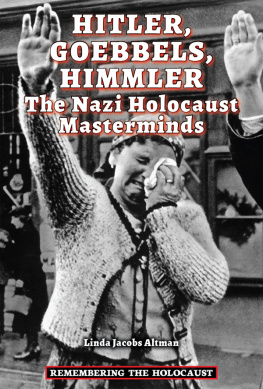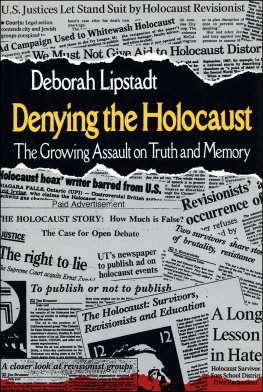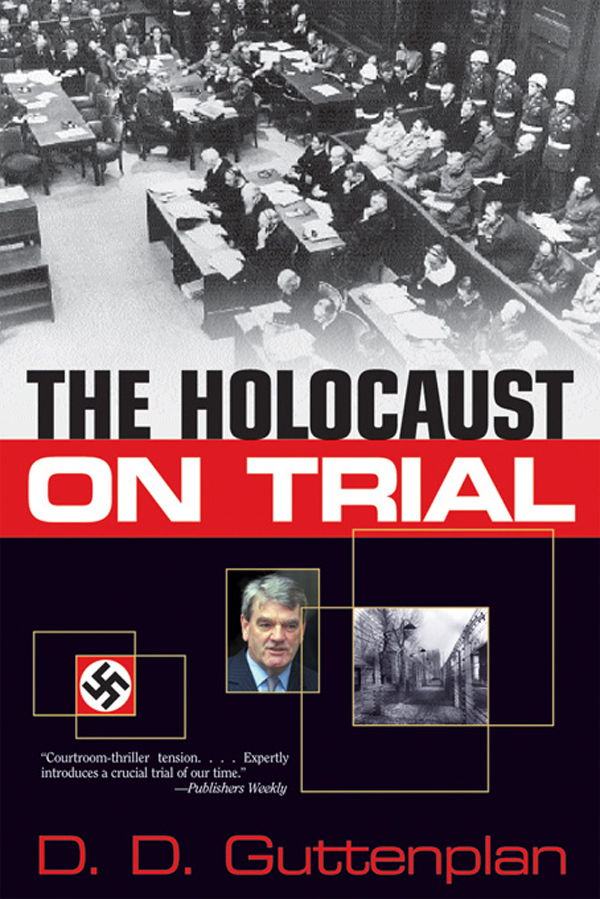
The Holocaust
on Trial
D.D. Guttenplan

W. W. Norton & Company
New York London
For Raul Hilberg
Contents
Acknowledgments
This book could not have been written without the cooperation, encouragement, and assistance of the following people:
Deborah Lipstadt and David Irving were both extremely generous in granting me extensive interviews before this case went to trial and in answering my often impertinent questions during the trial and after the judgment.
Anthony Julius and James Libson at Mishcon de Reya, Kevin Bays and Mark Bateman at Davenport Lyons and Helena Peacock at Penguin Books were all remarkably patient in helping a non-lawyer to understand both the libel process and the legal issues at stake. I am particularly grateful to Anthony Julius and Mark Bateman for their consistently generous and helpful responses to my questions.
Charles Gray, the trial judge, surprised me by granting a request for an interview before the trial began. We never spoke again, but his former clerk, Kim Janes, furnished me with a wealth of material relating to his career as a libel barrister, while his current clerk, John Lloyd, made sure I had access to the proceedings and then to the transcripts despite my being both a foreigner and a stranger to the courts.
Don Honeyman, Gitta Serenys husband, allowed me access to material related to Irvings suit against Ms. Sereny and the Observer ; David Parsons of Lovell White Durrant, who represent Sereny and the Observer , helped me to understand how the two cases were related. Adam Bellow, who edited the American edition of Denying the Holocaust , helped me to make sense of the books publishing history. Michael Rubinstein, who once represented Irving, helped me to make sense of Irvings legal history.
Christopher Browning, Richard Evans, Peter Longerich and Robert Jan van Pelt all answered my post trial questions with great candor and clarity. In the case of Evans and van Pelt this cooperation was all the more generous in that both men knew I was not unreservedly enthusiastic about their performance in the witness box; indeed Robert Jan van Pelt answered so many of my queries with such consistent kindness I felt constrained to remind him of my strictures. I am profoundly indebted to him and to his exemplary scholarship.
Writing for me is a way of thinking things through. My first attempt to understand what was at stake in this trial came in an article for the New York Times . I take great pleasure in acknowledging my debt to Patricia Cohen for commissioning that piece and for helping me to meet the Times s standards of fairness and balance. She and I are both veterans of the late lamented New York Newsday , where such matters, though taken seriously, were perhaps less of a fetish. But my own roots are firmly in advocacy journalism, so it was with both amusement and amazement that I read an attempt in the New Republic to use what the magazine called my fine relaxing balance as a stick with which to beat both Ms. Cohen and the Times . Not every writer gets the satisfaction of such a speedy public response; for that, and for the incoherent ferocity of the attack, I am grateful to the editors of the New Republic .
My debt to the Atlantic Monthly is of a different order altogether. Jack Beatty commissioned 10,000 words to run on the eve of the trial, then accepted, edited, and printed over 15,000 words. Avril Cornel made contacting the magazine a pleasure rather than a burden. Amy Meeker and Yvonne Rolzhausen saved me from errors great and small, and particularly impressed my British sources with their tireless willingness to discuss nuances of meaning and their reverence for facts. None of this, however, would have been possible without the unwavering support of William Whitworth, a man I have still never met, and to whom I fear I never sufficiently acknowledged my gratitude for what was by any measure the most satisfying editorial experience of my journalistic career. For his initial queries, his consistently helpful advice, and most of all for his persistent questioning of whether what I wrote was what I really meanthis deep faith that it was in fact possible to get it rightI remain profoundly grateful.
It was my agent, Andrew Wylie, who first suggested writing a book about the IrvingLipstadt libel trial. I thank him for that, for his serene confidence, and most of all for sticking with me through some long lean years. Thanks also to Zoe Pagnamenta, Helen Allen, Rose Billington, Georgia Garrett, Martha Lowe, and Emma Smart at the Wylie Agency.
Starling Lawrence at W.W. Norton and Neil Belton at Granta Books responded to my proposal to write about the trial with great enthusiasm and intelligence. I feel particularly fortunate to have editors on both sides of the Atlantic who understood immediately the importance of the trial, and who were both so willing and able to engage with the questions this book tries to answer. My thanks also to Sajidah Ahmad at Granta for guiding me through the production process, and to Drake Bennett at Norton for some crucial assists.
The United States National Archive cartographic division contains an extraordinary wealth of aerial photographs of Auschwitz and Birkenau, many of them digitized and available for viewing on-line at www.nara.gov . I thank Iris Cooper of the National Archive for helping me to reach the right person, and Sam Welch of the cartographic division for giving me permission to reproduce two aerial photographs.
I am a reporter, not a scholar. But in my various attempts to make sense of this trial I have benefited from the advice (which I have not always followed) and opinions (with which I have not always agreed) of the following scholars: Michael Berkowitz, Ruth Birn, Norman Finkelstein, Gerald Fleming, Michael Geyer, Eric Hobsbawm, and Jonathan Sarna. I am also indebted to Mark Mazower, both for his helpful comments and for the example of his own scrupulous, deeply engaged scholarship. Herr Dobblestein, of the legal section of the German Consulate in London, helped me to understand his countrys laws against Holocaust denial. My cousin, the philosopher Samuel Guttenplan, helped to clarify my understanding of the epistemological questions. Sir Martin Gilbert, whom I met in the course of the trial, responded with characteristic generosity to my many requests for information. I should add that while I am indebted to all of them, none should be held responsible for the opinions expressed in this book or the mistakes that remain, which are entirely of my own making.
As an independent researcher I wish to thank the staff at the Wiener Library, who let me borrow one of the few copies of Peter Novicks book in Britain for months at a time; I am also grateful for the superb collection at University College London, where the American librarian, Ruth Dar, displayed similar indulgence. I also thank Dr. Eric Halpern, my supervisor at UCL, and Dr. Kathleen Burk, my director of studies, for allowing me to interrupt my studies in American History to write this book.
A trial is an enclosed universe, cut off from the rest of life by the protocols of court procedure and the fanatical attention paid by its inhabitants to meanings incomprehensible to the outside world. In the press section, Eva Menasse and James Buchan were singularly pleasant and stimulating companions whose understanding of the proceedings helped shape my own. Eva made it possible for a non-German speaker to follow the at times arcane arguments over the precise meanings of German words; Jamie first called my attention to the parallels between David Irving and Dio Chrysostom. Sam Tanenhaus, a visitor to the press section and newfound friend, proves you dont have to be a lefty to be a mensch . Dan Yurmans internet digest of trial coverage was a valuable resource, and Hilary Ostrovs e-mails kept me on my toes.
Next page

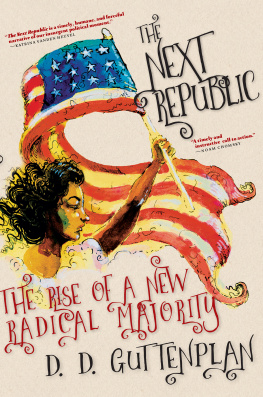
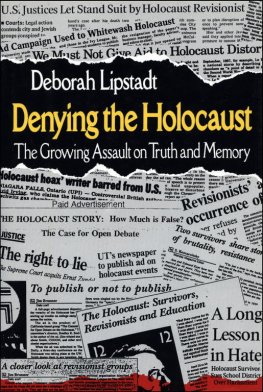
![Deborah E. Lipstadt - Denial [Movie Tie-in]: Holocaust History on Trial](/uploads/posts/book/373085/thumbs/deborah-e-lipstadt-denial-movie-tie-in.jpg)
